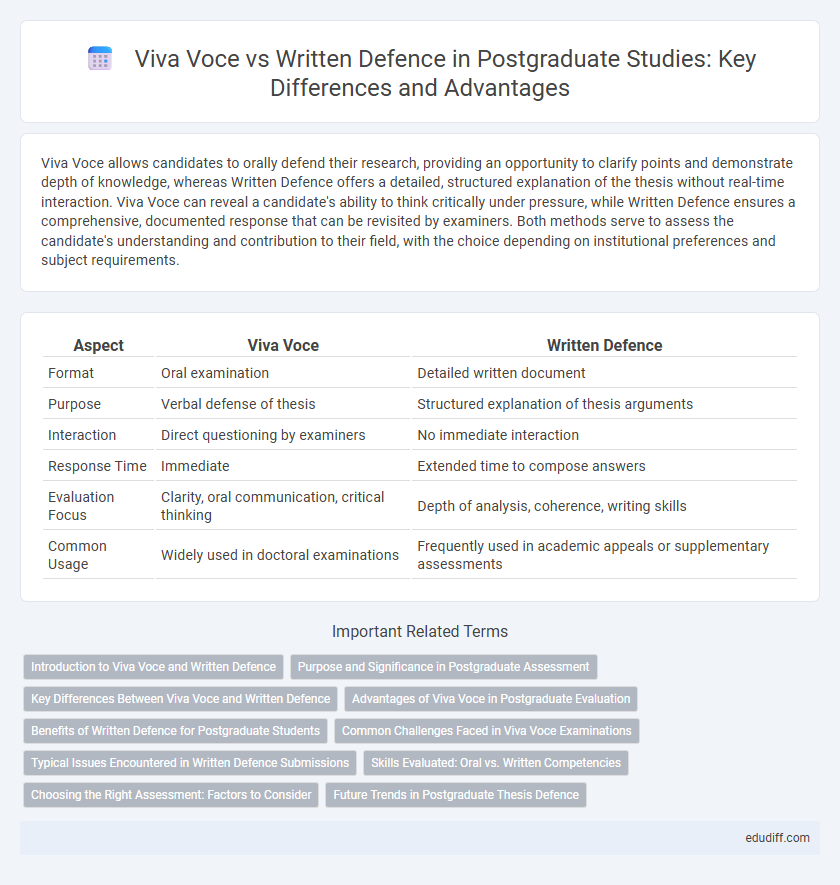Viva Voce allows candidates to orally defend their research, providing an opportunity to clarify points and demonstrate depth of knowledge, whereas Written Defence offers a detailed, structured explanation of the thesis without real-time interaction. Viva Voce can reveal a candidate's ability to think critically under pressure, while Written Defence ensures a comprehensive, documented response that can be revisited by examiners. Both methods serve to assess the candidate's understanding and contribution to their field, with the choice depending on institutional preferences and subject requirements.
Table of Comparison
| Aspect | Viva Voce | Written Defence |
|---|---|---|
| Format | Oral examination | Detailed written document |
| Purpose | Verbal defense of thesis | Structured explanation of thesis arguments |
| Interaction | Direct questioning by examiners | No immediate interaction |
| Response Time | Immediate | Extended time to compose answers |
| Evaluation Focus | Clarity, oral communication, critical thinking | Depth of analysis, coherence, writing skills |
| Common Usage | Widely used in doctoral examinations | Frequently used in academic appeals or supplementary assessments |
Introduction to Viva Voce and Written Defence
Viva Voce serves as an oral examination allowing candidates to verbally defend their research findings and demonstrate subject mastery through direct interaction with examiners. Written Defence, in contrast, entails a detailed, structured document that systematically addresses potential critiques and justifies the research methodology and conclusions without face-to-face questioning. Both methods are critical in postgraduate assessments, ensuring comprehensive evaluation of a candidate's scholarly competence.
Purpose and Significance in Postgraduate Assessment
Viva voce and written defence serve distinct purposes in postgraduate assessment, with viva voce providing an interactive platform for examiners to probe the candidate's understanding, clarify research findings, and evaluate critical thinking skills in real time. Written defence emphasizes the candidate's ability to articulate and justify their research methodology, data analysis, and conclusions comprehensively in a documented format. Both methods hold significant value in ensuring research originality, academic rigor, and mastery of subject matter at the postgraduate level.
Key Differences Between Viva Voce and Written Defence
Viva voce requires oral presentation and interactive questioning, allowing examiners to assess understanding and clarify concepts in real-time, whereas written defence involves submitting a detailed, structured document outlining research findings and arguments. The viva voce emphasizes verbal communication skills and immediate critical thinking, while written defence prioritizes comprehensive documentation and formal academic writing. Timing and format also differ: viva typically occurs as a scheduled oral examination, whereas written defence is submitted in advance for assessor review.
Advantages of Viva Voce in Postgraduate Evaluation
Viva Voce offers direct interaction between examiners and candidates, allowing for immediate clarification and deeper probing of research concepts, which enhances the assessment of critical thinking and subject mastery. This oral examination facilitates real-time feedback and assessment of communication skills, essential for academic and professional development in postgraduate studies. The dynamic nature of Viva Voce helps identify the candidate's originality and ability to defend their work convincingly, often providing a more comprehensive evaluation than a written defence alone.
Benefits of Written Defence for Postgraduate Students
Written defence offers postgraduate students the advantage of presenting their research in a structured, clear, and comprehensive manner, facilitating precise articulation of complex ideas. It allows for careful revision and refinement, reducing the pressure and potential for miscommunication often experienced during viva voce examinations. This method also provides a documented record of the defence that can be referenced by supervisors and examiners for thorough evaluation.
Common Challenges Faced in Viva Voce Examinations
Viva voce examinations often pose challenges such as managing anxiety, articulating complex ideas clearly, and responding promptly to unpredictable questions from examiners. Candidates frequently struggle with time constraints and the pressure to demonstrate deep subject knowledge while maintaining coherent, concise answers. Effective preparation and practice in verbal communication skills significantly improve performance and confidence during the viva voce process.
Typical Issues Encountered in Written Defence Submissions
Written defence submissions in postgraduate studies often face issues such as lack of clarity in argument presentation, insufficient evidence to support claims, and poor organization of content. Candidates frequently struggle with addressing examiner comments comprehensively and maintaining a consistent academic tone throughout the document. Inadequate referencing and failure to adhere to institutional guidelines further complicate the evaluation process.
Skills Evaluated: Oral vs. Written Competencies
Viva voce assessments emphasize oral communication skills, critical thinking, and the ability to defend ideas under pressure, evaluating clarity, coherence, and persuasive argumentation. In contrast, written defence demands strong written communication, organization, and the capacity to present complex arguments systematically, focusing on structure, grammar, and evidence synthesis. Both formats require subject mastery but develop distinct competencies crucial for academic and professional success.
Choosing the Right Assessment: Factors to Consider
Selecting the optimal postgraduate assessment method involves evaluating factors such as the candidate's communication skills, subject complexity, and the ability to defend research arguments effectively. Viva voce allows for dynamic interaction and immediate clarification of doubts, ideal for disciplines requiring oral articulation and critical thinking under pressure. Conversely, written defence suits candidates with strong writing skills and complex data presentation needs, providing a structured format to detail intricate research findings comprehensively.
Future Trends in Postgraduate Thesis Defence
Future trends in postgraduate thesis defence emphasize the integration of digital platforms for Viva Voce, enhancing accessibility and interactivity through virtual presentations and real-time feedback. Written defence formats increasingly adopt multimedia and AI-generated content analysis to complement traditional text-based submissions, ensuring comprehensive evaluation. Hybrid models combining Viva Voce and written defence elements are gaining traction, promoting a more flexible and rigorous assessment process.
Viva Voce vs Written Defence Infographic

 edudiff.com
edudiff.com